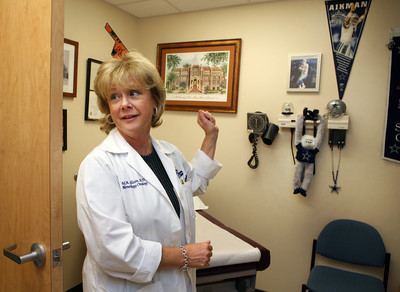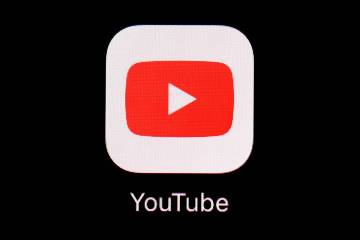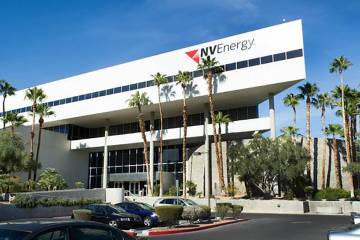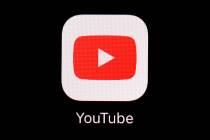Doctor helps cancer patients with closeness, compassion
For Dr. Mary Ann Allison, one successful career wasn't enough.
By her late 20s, Allison had spent more than half a decade as a medical technologist, studying and analyzing blood samples inside a Texas laboratory. But she yearned to reach beyond the lab experience and work with patients.
So Allison traded in her established life for medical school at the University of Texas, Galveston, where she shared dormitory digs with a younger roommate and commuted on weekends to see her husband in Dallas.
Six years out of medical school and on the hunt for a growing patient base, Allison and her family moved to Southern Nevada, where she co-founded Comprehensive Cancer Centers of Nevada with Dr. Paul Michael and Dr. Ed Kingsley. Today, 25 doctors work at the practice, treating cancers with methods ranging from conventional chemotherapy to some of the latest clinical trials.
Allison, whose practice emphasizes breast cancer, also co-founded The Caring Place, a center that offers free support and education services to cancer patients and their families. When she's not healing patients, Allison raises money for them: She helped organize Southern Nevada's first Komen Race for the Cure to support breast cancer patients, and she ran a half-marathon in October for the Leukemia and Lymphoma Society.
Question: Why did you opt for oncology as a subspecialty in your medical career?
Answer: Partly because that's what I was around in the lab. I enjoyed that laboratory aspect, and I thought I would be able to use my lab work as a physician. In medical school, you have to do three years of internal medicine during which you decide if you want to subspecialize. I kept gravitating back toward oncology patients. It was just something I enjoyed doing. For me, oncology patients are very special. Patients with cancer give us back as much as we try to give to them. Many times, you really see people at their finest moment when they're in the midst of a difficult situation, and that's very rewarding.
Question: How did you end up focusing on breast cancer?
Answer: I treated all cancers until about three years ago, when my practice started to gravitate that way. I had several breast surgeons who were referring patients to me, so my practice was at least half breast cancer patients. Over the last three years, three other people joined the practice with me in this office to treat other cancers, so I decided I would migrate that direction. We all find our niche, and it's kind of a good niche for me.
Question: How tough is it to deal with the potential downside that comes with patients who might not be doing well?
Answer: There are still a lot of situations we can't cure. There are sad days. If I concentrated on that, I wouldn't be able to do my job. I think you have to put in perspective what we do. If we have a great outcome, that's wonderful. That's the easy part. But sometimes, you really have to put your perspective in how can you make something better for someone, even if their cancer's not doing well.
We try to be compassionate and involved. One of the worst things you can do is be distant from your patients. It's easy to write prescriptions and chemotherapy, but it's more important to understand the patients and actually get to know them. When people think of cancer, they don't necessarily think of good things, but we see a lot of good here. There are times when I get choked up, but I try not to take my work home. I've raised two kids and I've been married 36 years, and for the most part, what keeps me going is a good family.
If I didn't have that support at home, it would be very hard. A doctor once told me, "Sometimes, the best view of the hospital is in your rear-view mirror." You just kind of go home and let it go.
Question: Anything that really stands out to you as a memorable experience on the job?
Answer: When I was just out of medical school in Texas, I had a lady come in with ovarian cancer. She'd had surgery, and after surgery her wound opened up. That's a pretty big deal. I treated her with chemotherapy. That was 20 years ago, and she still sends me a Christmas card every year. Those are the kinds of things that keep us going. It's very touching for me. I look for her card every Christmas, and I send her a card back. There are others out there. Another patient from Texas hit a 10-year survival mark, and he sent me a letter saying, "Thanks."
Question: How has the practice of medicine changed in Las Vegas since you moved here?
Answer: We have good medical care in Las Vegas. It's like any place: You can find good care here and you can find bad care here. Practicing here, I have the ability to do whatever I want as far as taking care of patients. If they need specialized treatments, we have close connections, such as an affiliation with the University of California, Los Angeles. As we've grown, we have also increased our research capabilities, so we have many more clinical trials than we did. As the population grows, you're able to attract people who can potentially be more specialized, and you can offer more types of treatments.
I came from an 85,000-person town, so for me to move to Las Vegas was huge. I had a lot more capabilities with radiology and more surgery options for patients. We have continued to grow to where we have more doctors in subspecialties and in primary care. And when you have more physicians, you just continue to build and have more opportunities. So I think the medical care here is very good. I have no hesitation over my family or myself being cared for here.
Question: Why did you co-found The Caring Place?
Answer: I had been to meetings where I'd seen the evolution of support systems for patients who were getting chemotherapy, and who had side effects such as hair loss. And although it's necessary to consider those concerns, you can't really look at that as the whole part of somebody's cancer experience. There was nothing in town that considered the mind, body and spirit. I needed some down time and went to a spa after a rough six months, and I had an epiphany. I learned how to meditate, and I learned about Reiki and other alternatives. I saw how much those approaches helped me, and I thought, if it could help me, maybe it could be a good thing for cancer patients. Because I don't think there's any other stress in their life that comes close to what they're going through on this journey.
You can take Valium, and I do use those kinds of treatments for my patients, but I think we have not given enough credence to some of these other forms of help.
If you can really get yourself in the right place I think you can handle a lot of things better.
Question: What are your future goals for the practice and your career?
Answer: I want us to be able to treat Las Vegas and Henderson residents at home. I want us to stay on the cutting edge in Las Vegas, and I think the way you do that is to stay active and bring younger physicians in. You need to stay vital. Oncology is an ever-changing field. New treatments come out every day, and I want us to stay current. I want us to grow so we can continue to offer as many options for patients in the valley as possible.
Contact reporter Jennifer Robison at jrobison@reviewjournal.com or 702-380-4512.
VITAL STATISTICS Name: Mary Ann Allison Age: 56 Position: Medical oncologist and partner, Comprehensive Cancer Centers of Nevada Family: Husband, Gary; sons, Scott and Randy Education: Medical degree from University of Texas, Galveston; internship and residency in internal medicine at Baylor University Medical Center, Dallas; fellowship in hematology-oncology at Baylor University Medical Center, Dallas Work history: Began practicing medicine in West Texas in 1987; joined Comprehensive Cancer Centers of Nevada in 1993 Hobbies: Jogging, family time, reading and rooting for the Dallas Cowboys, Texas Rangers and Big 12 college teams Favorite movie: "The Wizard of Oz" (1939) Hometown: Anywhere and everywhere, as an "Army brat" In Las Vegas since: 1993 Quotable: "Oncology is an ever-changing field. New treatments come out every day, and I want us to stay current." Comprehensive Cancer Centers of Nevada is at 10001 S. Eastern Ave., Suite 108, and can be reached at 952-3444

















